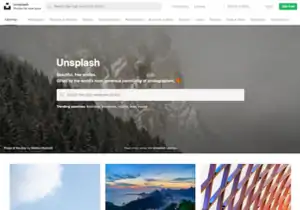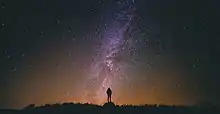Unsplash
Unsplash is a website dedicated to sharing stock photography under the Unsplash license. The website claims over 207,000 contributing photographers and generates more than 17 billion photo impressions per month on their growing library of over 2 million photos.[1] Unsplash has been cited as one of the world's leading photography websites by Forbes, Entrepreneur Magazine, CNET, Medium and The Next Web.[2][3][4][5][6]
 | |
Screenshot  | |
Type of site | Stock photography |
|---|---|
| Headquarters | Montreal, Quebec |
| Owner | Unsplash Inc. |
| Founder(s) |
|
| URL | unsplash |
| Registration | Optional |
Content license | Unsplash license (see License controversies); images published prior to June 2017 are undeclared but legally available as Creative Commons Zero |
Unsplash allows photographers to upload photos to its website, which are then curated by a team of photo editors. The permissive copyright terms on its photos have led to Unsplash becoming one of the largest photography suppliers on the internet,[7] with its members’ photos frequently appearing on articles. Nevertheless, their decision to stop using a creative commons "zero" licence in 2017 attracted criticism, as it took around 200,000 images out of the commons. The Unsplash licence is incompatible with creative commons licences, preventing use on sites like Wikipedia.
In February 2018, Unsplash changed their license terms to restrict the sale of photos without first updating, modifying, or otherwise incorporating new creative elements into the photos, prohibiting selling unaltered copies, including selling the photos as prints or printed on physical goods.[8]
In December 2019, Unsplash for Brands was launched, where advertisers can share branded images on Unsplash.
History
Initially a pioneer of the copyright-free photography model,[9] Unsplash was created in 2013 by Montreal-based entrepreneur Mikael Cho. While creating a new homepage for his company Crew, Cho was unable to find a suitable stock photo and hired a photographer instead.[10] Afterwards, Cho posted the outtakes from his company photoshoot on Tumblr, inviting people to use them as they saw fit.[11]
Before June 2017, photos uploaded to Unsplash were made available under the Creative Commons zero license, which is a public domain equivalent license and a waiver, which allowed individuals to freely reuse, repurpose and remix photos for their own projects. This was changed in June 2017,[12] and photos are now made available under the Unsplash copyright license, which imposes some additional restrictions.[13] Unsplash received more than 50,000 visits on its first day.[10]
On 18 February 2018 Unsplash changed its license terms to restrict the sale of photos without first updating, modifying, or otherwise incorporating new creative elements into the photos, prohibiting selling unaltered copies, including selling the photos as prints or printed on physical goods.
While Cho supplied the first batch of Unsplash photos, the site is now sustained by community contributions from amateur and professional photographers. Due to the volume of photo submissions, the site employs an editorial team and "curators" picked from the Unsplash community, including Guy Kawasaki, Nas, Khoi Vinh, Amanda Hesser and Om Malik.[14]
License controversies

Unsplash photos are covered by the Unsplash license. The Unsplash license prevents users from using photos from Unsplash in a similar or competing service.[15] While it gives downloaders the right to "copy, modify, distribute and use the photos for free, including commercial purposes, without asking permission from or providing attribution to the photographer or Unsplash"[13] the Unsplash terms of service prohibit selling unaltered copies, including selling the photos as prints or printed on physical goods.[16]
Before June 2017, Unsplash photos were covered by the Creative Commons zero license.[17][18][19]

Around 200,000 images were lost to the public domain. It was not possible to segregate or find which images had been available as CC0 prior to the licence change due to restrictions on the use of Unsplash's API. At the time of the licence change, Creative Commons Director Ryan Merkley asked that "[i]n order to ensure that the commons is maintained, we hope that Unsplash will either a) properly mark all the works shared using CC0 and/or b) make available a full archive of the CC0 works so they can be shared on a platform that supports open licensing".[20] To date, Unsplash have declined to make these works reavailable or easily identifiable by machines.
The Unsplash licence is incompatible with Creative Commons licences, meaning that content from Unsplash cannot be published under a creative commons licence without additional permissions from the original authors.[20] Unsplash actively prevent authors from offering their content under creative commons licences, for instance by deleting references to such licenses from comments.
The lack of attribution for Unsplash photos have been the subject of controversy among photography circles,[21] due to some companies using free Unsplash photography for profit without compensating the photographers. Unsplash itself has stated that it does not support the practice.[13]
Using the Internet Archive, one can still find images published before June 2017 as indicated.[22][23]

Book
In 2016, while still a CC0 business, Unsplash released the Unsplash Book, the world's "first ever fully crowd-sourced" book.[24] The book's photos, essays, and funding were all contributed by Unsplash's community.[25] The book raised $106,000 on Kickstarter and included contributions from Harvard law professor and CC0 inventor Lawrence Lessig, and designer Tobias van Schneider.[26]
Unsplash API
In addition to its website, Unsplash provides a public Application programming interface (API) that answers more than 3.8 billion photo requests per month.[27] Some of the products using the Unsplash API include Medium, Trello, Squarespace, Codepen, Square as well as Unsplash own series of products such as Unsplash for iOS, Unsplash Instant, an extension for Google Chrome that loads Unsplash photos in new tabs and Unsplash for Apple TV.[27]
Unsplash Local
Beyond its website and API, Unsplash has hosted photo walks in cities around the world including Tokyo, Montreal, Toronto and Boston.[28][29] The photo walks are hosted by guides from the Unsplash community who show participants the best places to take photos in their city, how to use their cameras, and how to compose better photos.[30]
References
- Unsplash. "Stats". Unsplash.com. Retrieved 17 August 2020.
- Laurinavicius, Tomas. "33 Epic Sites With Breathtaking Free Stock Photos". Forbes. Retrieved 5 January 2017.
- Ark, Casey. "14 Amazingly Free Stock Photo Websites". Entrepreneur. Retrieved 19 September 2016.
- Martin, Taylor. "Use these 7 sites to keep your desktop wallpaper fresh". CNET. Retrieved 4 November 2016.
- Senos, Dustin. "Stock photos that don't suck". Medium. Retrieved 10 December 2014.
- Zee. "Unsplash is a site full of images you can freely use for your next startup's splash page". The Next Web. Retrieved 4 January 2017.
- Czikk, Joseph. "Unsplash: We're the most viral photo site". Montreal in Technology. Retrieved 10 June 2016.
- Unsplash (6 March 2018). "The Unsplash License". Unsplash Blog. Retrieved 15 November 2018.
- Webb, Scott. "Free stock photography websites photographers must know ASAP". Retrieved 19 December 2016.
- Cho, Mikael. "How side projects saved our startup". Quartz. Retrieved 6 January 2017.
- Bourel, Fanny. "Mikael Cho : Une tenacité payante". Les Affaires. Retrieved 30 October 2016.
- "License | Unsplash". web.archive.org. 8 June 2017. Retrieved 19 January 2021.
- Unsplash. "Unsplash License". Unsplash.com. Retrieved 11 January 2017.
- Unsplash. "Unsplash Collections". Unsplash.com. Retrieved 11 January 2017.
- Unsplash. "License | Unsplash". unsplash.com. Retrieved 12 June 2017.
- https://unsplash.com/terms
- "Unsplash Licence (May 2017)". Archived from the original on 30 May 2017.
- "unsplash.com license 2013-2017 fair use". Pastebin.com. Retrieved 19 January 2021.
- "Unsplash | Free High-Resolution Photos". web.archive.org. 26 April 2015. Retrieved 19 January 2021.
- Merkley, Ryan (22 June 2017). "Community update: Unsplash branded license and ToS changes". Creative Commons.
- Tyler. "Unethical Unsplash". A Funny Thing Happened. Retrieved 11 December 2015.
- "By Greg Rakozy | Unsplash". web.archive.org. 1 January 2016. Retrieved 19 January 2021.
- "Unsplash | Free High-Resolution Photos". web.archive.org. 26 May 2015. Retrieved 19 January 2021.
- Ifking, Emma. "The first fully crowd-sourced open book". IT Key Media. Retrieved 8 September 2016.
- Unsplash. "Unsplash Book". Unsplash.com. Retrieved 20 June 2016.
- MacKay, Jory. "Want to be a published author?". Crew Blog. Retrieved 27 July 2016.
- Unsplash. "Unsplash API". Unsplash.com. Retrieved 17 August 2020.
- TimeOut Toronto. "Unsplash Toronto Photo Walk". TimeOut. Retrieved 1 January 2017.
- "History". Unsplash. Retrieved 17 January 2018.
- Unsplash. "Unsplash Local". Unsplash.com. Retrieved 11 January 2017.